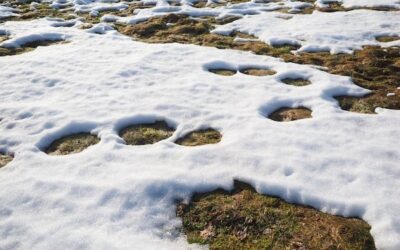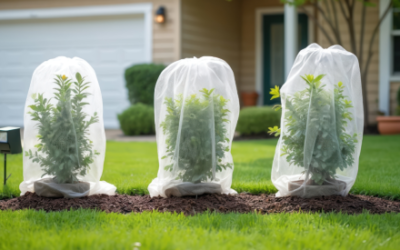As seasons change, and we begin to prepare for all the fun, excitement, and changes that fall and winter bring, we must pay special attention to preparing our garden. An unexpected freeze in spring or fall can have devastating effects on your plants if they are not properly protected. Following these guidelines will help to protect your plants from the damaging effects of frost and cold temperatures.
Bring Any Potted Plants Indoors
An easy way to protect potted plants is to simply bring them indoors when temperatures dip too low. Container plants may be especially vulnerable, and should always be brought inside for their protection. Potted plants in general are more susceptible to damage caused by frost because they are not insulated the way plants in the ground are. Once they are inside, you can protect them by placing them in areas with the amount of sunlight they need to thrive.
Layer Garden Beds with Mulch
In order to provide a barrier for your garden beds, a protective layer of mulch will help insulate plants during cold snaps. Apply a thick layer of mulch around your plants, paying special attention to tender and emerging plants. You can use dry mulch or straw, or even piles of leaves to provide extra protection for your plants as temperatures drop.
Water Plants in the Morning
Choosing the best time of day to water your plants can actually help protect them from frost and cold temperatures. Watering your plants in the morning in the wintertime is recommended. This is because the wet soil will absorb heat throughout the day, and provide an insulating effect. This will help support all the other protective measures you are taking to keep your plants safe and healthy during freezing temperatures.
Take Cover
You can also cover vulnerable plants with commercial frost cloths or row cover. These can be found at garden or hardware stores. You can even use tarps, old bedsheets, or plastic buckets. The idea is to cover and protect your plants from frost. Staking the material down is important so wind doesn’t lift the cover. When done properly, a blanket or covering can keep the heat from the soil in your plants, and maximize insulation.
An important thing to note is that if you use a plastic cover, such as a garbage bag, do not put it over fruit or foliage. The cold can transfer through the plastic and damage these plants.
During the day, remove any covering so that the plant can get the sunlight and oxygen it needs.
Place Tender, Vulnerable Plants in a Sheltered Area
To protect tender perennials from frost, you can lift them and store them in a frost-free but cool setting. This could be a potting shed, greenhouse, or basement. If you do not have these options, mini greenhouses can be purchased online. It is important to do this before the soil freezes for the first time. Once the winter season ends, your perennials will be ready for replanting.
Protect Plants with a Cloche
A cloche is a bell-shaped cover made from glass or plastic that can be placed directly over plants. You can purchase cloches or make your own out of recycled materials such as large juice or water containers. Cloches can be used to protect small plants and seedlings from dangerous frost. They will need to be removed during daytime hours so that the sun and air can reach the plants during that time, for optimum health.
A cloche can help your plants survive a late spring or early fall frost, thus extending the growing season.
Taking these steps will help keep your plants healthy and thriving during the winter. For professional help preparing for and keeping your lawn protected during the harsh winter months, contact us at Jack’s Lawn Care and Landscaping. We can help you take all the necessary steps to keep your lawn in tip top shape, no matter what the weather!



